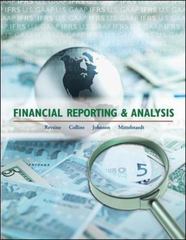Question
According to the article: https://www.bnnbloomberg.ca/recession-calls-mount-in-canada-on-double-hit-from-virus-oil-1.1404281 Canada appears on the brink of recession as the economy takes a double hit from the coronavirus and tanking oil
According to the article: https://www.bnnbloomberg.ca/recession-calls-mount-in-canada-on-double-hit-from-virus-oil-1.1404281
Canada appears on the brink of recession as the economy takes a double hit from the coronavirus and tanking oil prices, ramping up pressure on Prime Minister Justin Trudeau's government to deliver a fiscal stimulus package.
Bank of Nova Scotia, the country's third-largest lender, became the first major Canadian bank to forecast the country will fall into a mild recession this year unless the government moves ahead with a fiscal stimulus plan. Similar near-recession calls could follow as forecasts are revised down in the face of rapidly deteriorating conditions.
The downgrades come as Trudeau's government takes a cautious approach to dealing with the slowdown, promising just $1.1 billioninnew fundingto respond to the pandemic. In the absence of a significantly larger package, the rapid rise in coronavirus cases globally, sharp fall in oil prices and increasing volatility in financial markets will trigger an economic contraction, Jean-Francois Perrault, chief economist at Scotiabank, said Wednesday.
"A reasonably mild recession appears likely unless timely and targeted fiscal measures are deployed in the very near future to deal with the economic impacts of the virus," Perrault wrote in a research note.
The Canadian government's measures pale in comparison to more dramatic steps from central banks and governments around the world, with the Bank of Canada last week slashing interest rates by half a percentage point torestore confidence.
Global Response
The Bank of England made an emergency rate cut Wednesday, in co-ordination with a 30 billion pound (US$39 billion) stimulus package from Boris Johnson's government. In Italy, Prime Minister Giuseppe Conte is ready to spend as much as 25 billion euros ($28.3 billion) on stimulus to shield its economy from the worst outbreak of coronavirus outside China.
President Donald Trump, meanwhile, has opted to temporarilyban most travelto the U.S. from the European Union, while also laying out a series of fiscal measures to deal with the economic fallout. And on Thursday, Australia unveiled an A$17.6 billion (US$11.4 billion) fiscalstimulus package.
For Trudeau, it's "likely that stimulus will end up needing to be far larger than what's already been announced," Royce Mendes, an economist at Canadian Imperial Bank of Commerce, said by telephone Wednesday. His bank is also forecasting domestic growth will turn negative in back-to-back quarters this year, a situation economists refer to as a technical recession.
Domestic Outlook
Scotiabank sees the country's gross domestic product growth slowing to 0.3 per centfor the year, including two straight quarters of negative growth, in the absence of significant stimulus. Perrault recommends the government roll out a fiscal package equivalent to oneper centof GDP, or just over $20 billion, in order to prevent the Canadian economy from going into recession.
National Bank of Canada, the country's sixth-largest lender, also revised its forecasts for 2020 growth down to 0.6 per cent on Wednesday. "Our expectation for a late-year economic recovery, which could extend into 2021, is predicated on rapid and significant policy responses, both from central banks and from governments," National Bank's economics team said in a note.
Bank of Montreal was the first of the six banks to revise their forecasts lower this week, with a call for full year GDP growth at 0.5 per cent. Goldman Sachs is predicting Canada's economy is on the "verge of recession," forecasting no growth in the first quarter of this year and a contraction in the second quarter.
The latest stream of downward revisions include predictions that the Bank of Canada will cut rates to 0.25 per centby June from its current 1.25 per cent. That's in line with financial market expectations, according to overnight index swaps trading. The last time the Bank of Canada policy rate reached 0.25per cent was in 2009. Earlier this month, the central bank cut interest rates by 50 basis points amid escalating coronavirus concerns, matching an emergency move by the Federal Reserve.
1- Provide a synopsis on how COVID 19 is affecting Canada's economy
2- State and explain how each component of the GDP eqaution is (and will be) affected as the crisis deepens, based on your understanding of the article above and events going on around us.
Step by Step Solution
There are 3 Steps involved in it
Step: 1

Get Instant Access to Expert-Tailored Solutions
See step-by-step solutions with expert insights and AI powered tools for academic success
Step: 2

Step: 3

Ace Your Homework with AI
Get the answers you need in no time with our AI-driven, step-by-step assistance
Get Started


